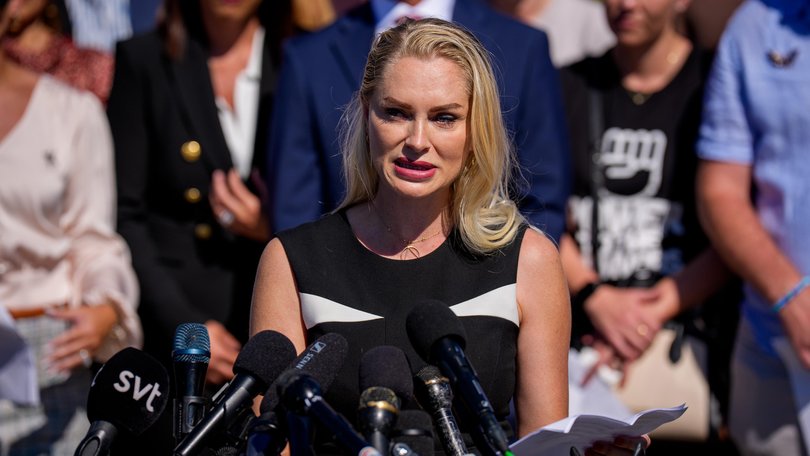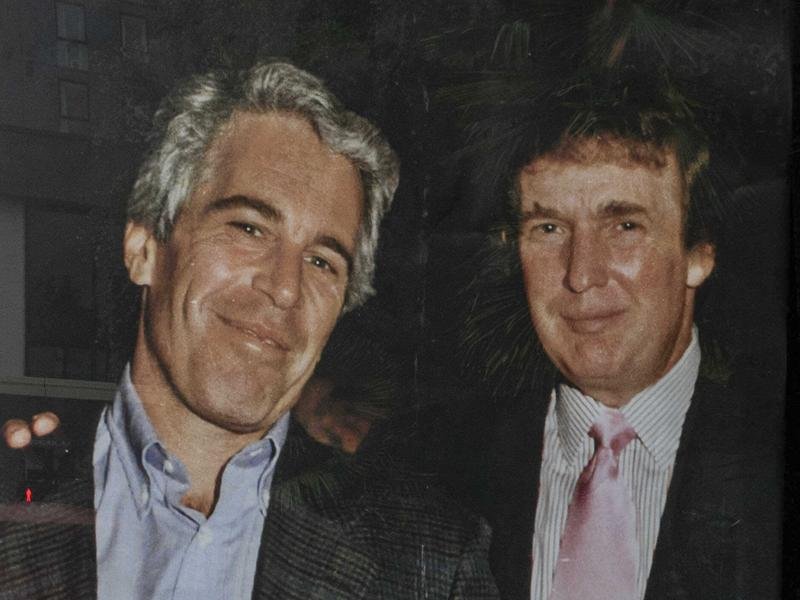THE NEW YORK TIMES: Republicans thwart Jeffrey Epstein disclosure bill as accusers plead for files
THE NEW YORK TIMES: Jeffrey Epstein’s victims shared harrowing stories of sexual abuse, pleading with members of Congress to demand the Trump administration release all of its investigative files in the case.

With the Capitol towering behind them, several women who said they had been among Jeffrey Epstein’s victims shared harrowing stories of sexual abuse, pleading with members of Congress to demand that the Trump administration release all of its investigative files in the case.
Lawmakers in both parties stood behind them, vowing to keep the pressure on for the disclosures.
Even one of President Donald Trump’s closest allies, Republican Marjorie Taylor Greene, said the files must come out.
Sign up to The Nightly's newsletters.
Get the first look at the digital newspaper, curated daily stories and breaking headlines delivered to your inbox.
By continuing you agree to our Terms and Privacy Policy.None of it appeared to be enough to outweigh the pressure from Trump and Republican leaders, who have moved quickly to squelch legislation that would require the Justice Department to quickly and completely release what it uncovered about Epstein, the disgraced financier and convicted sex offender who died in prison in 2019 while awaiting trial on sex trafficking charges.
Momentum was flagging behind an effort by representatives Thomas Massie, (Republican Kentucky) and Ro Khanna, Democrat California), to force the House to vote on the measure, after most Republicans who initially said they would back it fell in line with the President’s exhortations to let the issue die.
Even as Epstein’s accusers spoke at the Capitol, some of them growing emotional as they recounted their experiences, Trump at the White House dismissed the effort to get more files released as a “Democrat hoax that never ends.”
Hours later, House Republicans united to push through an alternative measure backed by Speaker Mike Johnson that directed the House Oversight Committee to continue an investigation into the handling of the Epstein case that it started weeks ago after being forced to do so by Democrats. No such resolution was needed to authorise the inquiry, which is already underway.

So far, it has turned up little new information; an initial tranche of files the Justice Department sent to the committee contained mostly information that had already been public, and the panel has said it will take time for the department to comply with its subpoena for all documents in the case.
But for now, Massie and Khanna’s bill — which would require the Justice Department to produce all its files about the Epstein investigation within 30 days — remains stalled. To force a floor vote on it, they need the majority of the House, or 218 members, to sign a so-called discharge petition. With all 212 Democrats expected to sign, that means six Republicans would be needed to move forward.
As of Wednesday evening, the number of GOP signers was frozen at four: Massie, Greene, and Reps. Lauren Boebert of Colorado and Nancy Mace of South Carolina.
Members of Congress could still be swayed by vocal constituents unhappy that they dodged a vote, an outcry that Massie at one point actively courted.
“Congressmen listen to you,” Massie said at a news conference with the survivors, addressing viewers who might be watching at home. “Light up their phones, burn down the phone lines here in Washington, D., and ask them the questions that these survivors wanted you to ask them: ‘Why won’t you be for transparency?’”
Still, there were signs that the White House’s pressure campaign had succeeded in quashing any traction that Massie’s effort had gained before lawmakers departed for their recess in July. At that time, 11 Republicans signed on as co-sponsors of his bill, reflecting a sharp division within the party on how to address the Epstein issue.
That rift still remains potent on Capitol Hill. But at least three lawmakers who previously backed Massie’s legislation have said they will not sign his discharge petition: Anna Paulina Luna of Florida, Tim Burchett of Tennessee and Keith Self of Texas. Several others have yet to sign the petition or publicly comment on the matter.
Rep. Victoria Spartz (Republican Indiana), was among the large crowd gathered at Wednesday’s news conference. She left shortly before it concluded, after all the women had shared their accounts, but would not commit to signing Massie’s petition.
“These women deserve justice,” she said. But, she added, “I need to see what is the best approach.”
The White House, for its part, has made its opposition to Massie’s bill clear. Trump is known to target Republican lawmakers he sees as obstacles to his political agenda. An official who described the Trump administration’s thinking on the condition of anonymity said that signing the discharge petition would be viewed as a “very hostile act to the administration.”
Greene, for years one of Trump’s foremost allies on the Hill, rejected the argument.
“This isn’t a hostile act toward the administration,” she told reporters after Wednesday’s news conference. “The hostile act has been against these women for so many years now.”
She also said that she had told Trump that he should invite Epstein’s victims to the White House for a meeting but had yet to receive a response.
Haley Robson, who accused Epstein of groping her and said that she was pushed to recruit other teenage girls to avoid further abuse, also called to meet with Trump, in part to deny his repeated insistence that the call for the Epstein files was a hoax.
“I would like Donald J. Trump and every person in America and around the world to humanize us, to see us for who we are and to hear us for what we have to say,” said Robson, who noted that she was a registered Republican. “There is no hoax. The abuse was real.”
Marina Lacerda, who until recently had not spoken publicly about her abuse, said that she met Epstein when she was 14. Choking up as she spoke, she described emigrating from Brazil and working three jobs in New York to help support her family when a man told her she could make $300 to give an “older guy” a massage at his home in Manhattan.
“The worst part is that the government is still in possession right now of the documents and information” about it that could “help me remember and get over all of this,” she said later.
Johnson has said that Massie’s measure is “inartfully drafted,” repeatedly criticising it for not doing enough to protect the victims or redact their identifying information. Several lawmakers, including Burchett, have cited those concerns as their reason for not signing on to Massie’s effort.
But Massie’s bill would allow the Justice Department to shield victims’ personal information or anything that “would constitute a clearly unwarranted invasion of personal privacy,” as well as child sexual abuse materials and “images of death, physical abuse, or injury of any person” from public view.
Anouska De Georgiou, who has said that Epstein sexually abused her when she was a teenager, said, “The only motive for opposing this bill would be to conceal wrongdoing,” adding that “accountability is what makes a society civilised.”
Toward the end of the news conference, Brad Edwards, a lawyer for the victims, said none of them shared Johnson’s concerns.
“I think all of them are on the same page that they want everything released,” he said.
Behind him, several of the women began shouting, “Pass the bill!”
Originally published on The New York Times
